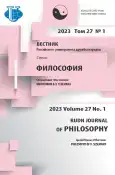Концепция сознания в рукописях Василия Сеземана
- Авторы: Йонкус Д.1
-
Учреждения:
- Университет Витаутас Магнус
- Выпуск: Том 27, № 1 (2023): ФИЛОСОФИЯ В.Э. СЕЗЕМАНА
- Страницы: 41-51
- Раздел: ФИЛОСОФИЯ В.Э. СЕЗЕМАНА
- URL: https://journal-vniispk.ru/2313-2302/article/view/325278
- DOI: https://doi.org/10.22363/2313-2302-2023-27-1-41-51
- EDN: https://elibrary.ru/NFBOVR
- ID: 325278
Цитировать
Полный текст
Аннотация
В рукописном тексте Василия Сеземана «Самопознание, самосознание и объективация» исследуются отношения сознания с самосознанием и бессознательным, а также различные формы объективации сознания. Эту рукопись можно отнести к группе рукописных текстов, в которых обсуждается происхождение сознания и метафизическая взаимосвязь между материей и духом. Сеземан изучал сознание, описывая его как интенциональный опыт и отвергая его натуралистические объяснения. Сеземан раскрыл несводимость жизни к физиологическим и химическим процессам и в то же время отверг дуалистическую противоположность духа и материи, души и тела. Цель статьи - показать, что Сеземан сформулировал феноменологическую концепцию сознания. Философ отверг натуралистические и объективистские объяснения сознания и утверждал, что сознание следует исследовать как субъективный опыт, а не как объект. Сеземан критиковал натуралистическую психологию и утверждал, что сознание есть интенциональная деятельность в мире. Сознание - это воплощенное самосознание и эмпатическая связь с другими живыми существами.
Ключевые слова
Об авторах
Далюс Йонкус
Университет Витаутас Магнус
Автор, ответственный за переписку.
Email: phenolt@yahoo.com
ORCID iD: 0000-0001-8879-878X
доктор философских наук, профессор кафедры философии
Lithuania, 44248, LT-44243, Kaunas, K. Donelaičio, 58Список литературы
- Botz-Bornstein T. Vasily Sesemann: Experience, Formalism, and the Question of Being. Amsterdam, New York: Rodopi; 2006.
- Belov VN. V.E. Sesemann - Systematist of Russian Neo-Kantianism. Voprosy filosofii. 2012;(4):121-127. (In Russian).
- Czardybon B, Belov WN. Znajomość postaci i idei rosyjskiego neokantyzmu w Polsce. Diametros. 2017;(52):1-22.
- Yonkus D. La Fenomenologia de la razon y la experiencia estetica. Edmund Husserl y Vasily Sesemann. Investigaciones Fenomenológicas. 2014;(11):129-142. https://doi.org/10.5944/rif.11.2014.29568
- Jonkus D. Vasily Sesemann’s Theory of Knowledge, and Its Phenomenological Relevance. In: Płotka W, Eldridge P, editors. Early Phenomenology in Central and Eastern Europe. Main Figures, Ideas, and Problems. Berlin: Springer; 2020. P. 93-110.
- Jonkus D. Critical Ontology and Critical Realism. The Responses of Nicolai Hartmann and Vasily Sesemann to Husserl’s Idealism. In: Parker R, editor. The Idealism-Realism Debate among Edmund Husserl’s Early Followers and Critics. Berlin: Springer; 2021. P. 99-118.
- Jonkus D. Phenomenological Approaches to Self-consciousness and the Unconscious (Moritz Geiger and Vasily Sesemann). Studia Phaenomenologica. 2015;(15):247-258. https://doi.org/10.5840/studphaen20151513
- Jonkus D. Body and Time in Sesemann’s Philosophy of Culture: Preface to the Publication of the Vasily Sesemann’s Manuscript “Sport and Contemporary Culture”. RUDN Journal of Philosophy. 2021;25(3):524-532. (In Russian). https://doi.org/10.22363/2313-2302-2021-25-3-524-532
- Sesemann V. The relationship of spirit and matter. Manuscripts Department of the Vilnius University Library. F122-96. (In Russian).
- Sesemann V. Self-knowledge, self-consciousness and objectification. Manuscripts Department of the Vilnius University Library. F122-102. (In Russian).
- Sesemann V. Subjective and objective attitudes of consciousness, their difference and relationship. Manuscripts Department of the Vilnius University Library. F122-86. (In Russian).
- Sesemann V. Philosophy of organic nature. Manuscripts Department of the Vilnius University Library. F122-4.
- Husserl E. Natur und Geist: Vorlesungen Sommersemester 1927. Husserliana 32. Dordrecht: KluwerAcademic Publishers; 2001.
- Husserl E. Natur und Geist: Vorlesungen Sommersemester 1919. Husserliana Materialien Band 4. Dordrecht: KluwerAcademic Publishers; 2002.
- Plessner H. Die Stufen des Organischen und der Mensch. Einleitung in die philosophische Anthropologie. Berlin, New York: Walter de Gruyter; 1975.
- Sezemanas V. Organiškojo pasaulio laiptai ir žmogus. Vairas. 1930;4(7):13-11.
- Sesemann V. On the problem of pure knowledge. Belov VN, transl. Logos. 2006;6(57):119-162.
- Sesemann W. Beiträge zum Erkenntnisproblem. Über gegenständliches und ungegenständliches Wissen. Lietuvos universiteto Humanitarinių mokslų fakulteto raštai. 1927; (2):69-142.
- Sesemann W. Studien zum Erkenntnisproblem. Rationales und Irrationales. Humanitarinių mokslų fakulteto raštai. 1927;3(4):127-192.
- Sezemanas V. Gnoseologija. In Raštai. Gnoseologija. Lozuraitis A, editor. Vilnius: Mintis; 1987. P. 209-334.
- Seseman V. Time, culture and body. To the knowledge of the cultural tasks of our time. In: Thirties. The approval of the Eurasians. Book VII. Paris: Eurasian Publishing House; 1931. P. 147-190. (In Russian).
- Schloßberger M. Phänomenologie der Naturerfahrung. Einfühlung und Einsfühlung mit der Natur bei Geiger und Scheler. In: Natur und Kosmos. Entwürfe der frühen Phänomenologie. Nordhausen: Traugott Bautz GmbH; 2019. P. 55-75.
Дополнительные файлы









